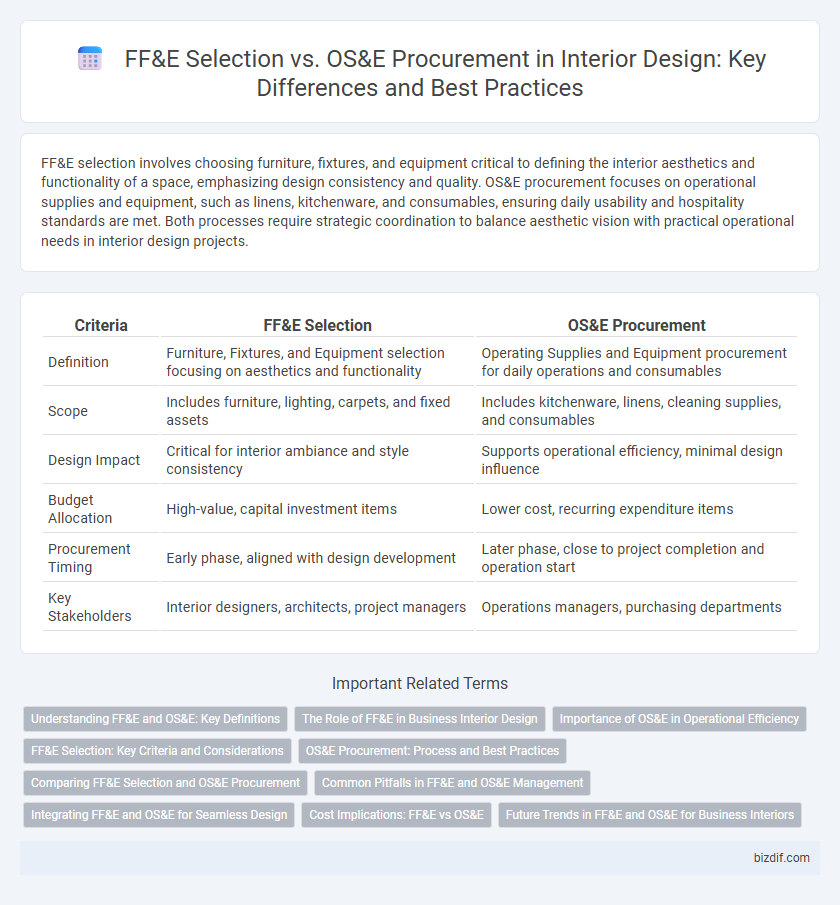FF&E selection involves choosing furniture, fixtures, and equipment critical to defining the interior aesthetics and functionality of a space, emphasizing design consistency and quality. OS&E procurement focuses on operational supplies and equipment, such as linens, kitchenware, and consumables, ensuring daily usability and hospitality standards are met. Both processes require strategic coordination to balance aesthetic vision with practical operational needs in interior design projects.
Table of Comparison
| Criteria | FF&E Selection | OS&E Procurement |
|---|---|---|
| Definition | Furniture, Fixtures, and Equipment selection focusing on aesthetics and functionality | Operating Supplies and Equipment procurement for daily operations and consumables |
| Scope | Includes furniture, lighting, carpets, and fixed assets | Includes kitchenware, linens, cleaning supplies, and consumables |
| Design Impact | Critical for interior ambiance and style consistency | Supports operational efficiency, minimal design influence |
| Budget Allocation | High-value, capital investment items | Lower cost, recurring expenditure items |
| Procurement Timing | Early phase, aligned with design development | Later phase, close to project completion and operation start |
| Key Stakeholders | Interior designers, architects, project managers | Operations managers, purchasing departments |
Understanding FF&E and OS&E: Key Definitions
FF&E (Furniture, Fixtures, and Equipment) refers to movable interior items like chairs, desks, and lighting that enhance a space's functionality and aesthetic, while OS&E (Operating Supplies and Equipment) includes essential consumables and operational tools such as linens, kitchenware, and cleaning supplies. Proper distinction between FF&E and OS&E ensures accurate budgeting, procurement, and project management in interior design. Clear understanding of these key definitions supports seamless integration of design elements with operational needs in hospitality, healthcare, and corporate environments.
The Role of FF&E in Business Interior Design
FF&E (Furniture, Fixtures, and Equipment) plays a critical role in business interior design by shaping the functional aesthetics and enhancing user experience within commercial spaces. Strategic FF&E selection influences brand identity, operational efficiency, and compliance with industry standards, distinguishing it from OS&E (Operating Supplies and Equipment), which primarily covers expendable items. Investing in quality FF&E supports long-term business value through durability, adaptability, and design cohesion essential for corporate environments.
Importance of OS&E in Operational Efficiency
OS&E procurement plays a critical role in operational efficiency by ensuring the availability of essential items such as linens, kitchenware, and cleaning supplies that support daily functions in hospitality and commercial interiors. Unlike FF&E selection, which focuses on fixed furnishings and decor elements, OS&E directly impacts service quality and maintenance workflows. Effective OS&E management reduces downtime, minimizes operational disruptions, and enhances overall guest experience through timely replenishment and quality control.
FF&E Selection: Key Criteria and Considerations
FF&E selection in interior design prioritizes durability, aesthetic appeal, and functional compatibility with the overall space concept. Key criteria include material quality, cost-effectiveness, supplier reliability, and compliance with safety standards to ensure long-term value and guest satisfaction. Considerations also encompass design alignment with brand identity, ease of maintenance, and product lifecycle for sustainable procurement decisions.
OS&E Procurement: Process and Best Practices
OS&E procurement involves the sourcing and purchasing of operational supplies and equipment essential for hospitality and commercial interiors, including linens, kitchenware, and cleaning products. Effective OS&E procurement processes emphasize vendor evaluation, cost analysis, and inventory management to ensure timely delivery and budget compliance. Best practices include establishing clear specifications, leveraging technology for tracking orders, and maintaining strong supplier relationships to enhance quality control and operational efficiency.
Comparing FF&E Selection and OS&E Procurement
FF&E selection involves choosing fixed furnishings such as furniture, fixtures, and equipment that define the aesthetic and functional foundation of an interior space, ensuring durability and style alignment. OS&E procurement focuses on acquiring operational supplies and equipment like linens, tableware, and small appliances essential for the daily use and maintenance of the environment. Comparing FF&E and OS&E highlights that FF&E targets long-term design elements while OS&E emphasizes consumable and replaceable items critical for operational efficiency.
Common Pitfalls in FF&E and OS&E Management
FF&E selection often suffers from inadequate specification alignment, leading to mismatched aesthetics and functionality that compromise the design intent. OS&E procurement challenges include underestimating lead times and neglecting quality control, resulting in delays and increased costs. Overlooking coordination between FF&E and OS&E phases creates logistical bottlenecks and inventory discrepancies, impacting project timelines and budget adherence.
Integrating FF&E and OS&E for Seamless Design
Integrating FF&E (Furniture, Fixtures, and Equipment) and OS&E (Operating Supplies and Equipment) ensures a cohesive interior design that balances aesthetics with functionality. Thoughtful selection and procurement processes align materials, colors, and styles, creating a seamless transition between decorative elements and operational necessities. This holistic approach enhances both visual appeal and user experience, optimizing space utilization and brand consistency.
Cost Implications: FF&E vs OS&E
FF&E selection involves substantial upfront capital investment in durable furniture, fixtures, and equipment, often reflecting long-term asset value and depreciation schedules. OS&E procurement, by contrast, typically incurs recurrent operational expenses due to consumable items and supplies necessary for daily functions. Cost implications reveal FF&E as a fixed, budget-intensive allocation, whereas OS&E represents variable, ongoing expenditure impacting operational cash flow.
Future Trends in FF&E and OS&E for Business Interiors
Future trends in FF&E (Furniture, Fixtures & Equipment) and OS&E (Operating Supplies & Equipment) for business interiors emphasize sustainability and smart technology integration, driving demand for eco-friendly materials and IoT-enabled furnishings. Customizable and modular designs are increasingly preferred to enhance flexibility and adaptability in dynamic work environments. Advanced procurement strategies leverage data analytics to optimize cost-efficiency and supply chain transparency in both FF&E selection and OS&E sourcing.
FF&E selection vs OS&E procurement Infographic

 bizdif.com
bizdif.com